If you’ve never seen a real life whale in the flesh then you’re missing out. These majestic mammals are mesmerizing and the South African coastline is touted as one of the best whale watching destinations in the world. Prime whale watching season takes places between June and December with the best times being between August and October, but this can vary a little from year to year.
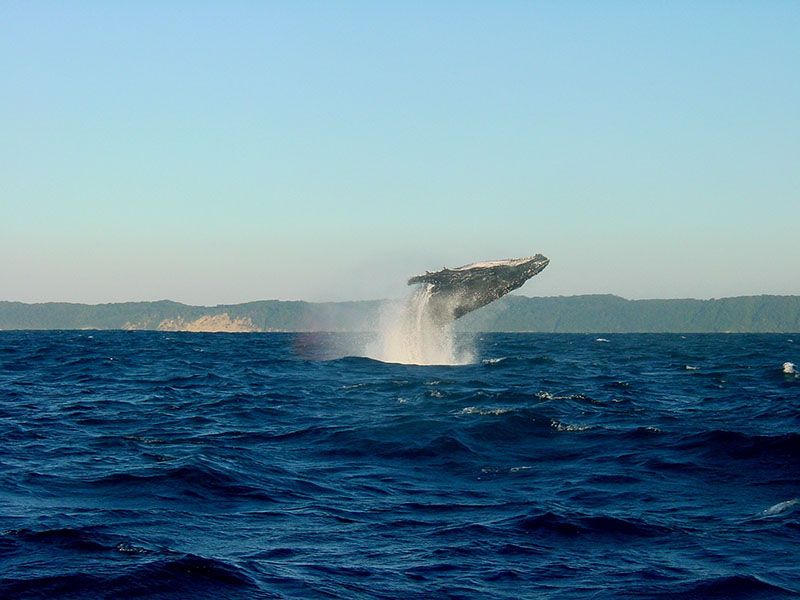
The most commonly sighted species is the southern right whale that migrates annually from the cold waters of Antarctica to the warmer Cape Town coast to frolic, mate and give birth. You can pick out these prehistoric looking beasts by the callosities on their heads, which are rough patches of skin covered in barnacles. Also look out for other distinguishing features such as their double blowholes, long mouths and extremely slow speeds, which make it hard to miss them. Between May and November, you might also catch sight of the friendly humpback whales with their characteristic humps and long fins who are often seen playing with bottlenose dolphins. The sleek Bryde’s whales with three ridges near their blowhole can be spotted all year round but they’re a shyer breed and stay further out in the ocean, diving for long periods of time. If you’re really lucky, you might also spot the occasional orca during whale season.
If you’d like to get up close and personal with all things cetacean during your time in Cape Town then here are our top five spots to see them:
1. Hermanus
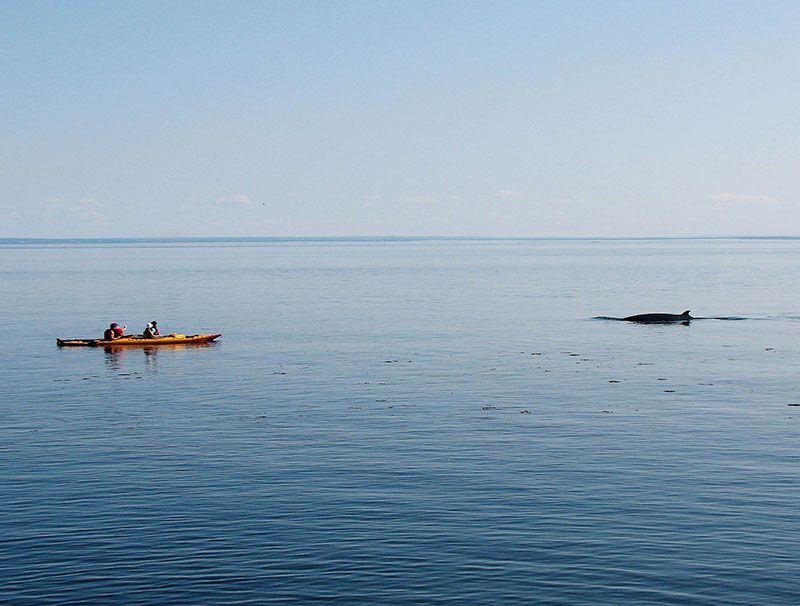
Just a two-hour drive from Cape Town, the small town of Hermanus is considered the whale watching capital of South Africa. Here, the whales often come in close to the shore so you can view them from the safety of dry land along a beautiful 12-kilometre-long walkway on the cliffs — so close that you might even get wet from the sprays of breaching whales. The most popular viewing points are at the Old Harbour, Gearings Point and Siever’s Point and there are various information stations along the way so you can bone up on your whale knowledge.
During high season, there’s even a whale crier in place who blows on a kelp horn to alert you to the presence of whales in the waters. For those who’d prefer to get out on the water, there are various boat trips available as well as kayaking tours for even braver souls. While a visit to Hermanus is worth it at any time during whale season, the annual Hermanus Whale Festival around the end of September is a fun time to go as it combines great food, drink and merriment with some serious whale watching.
2. Gansbaai and De Kelders
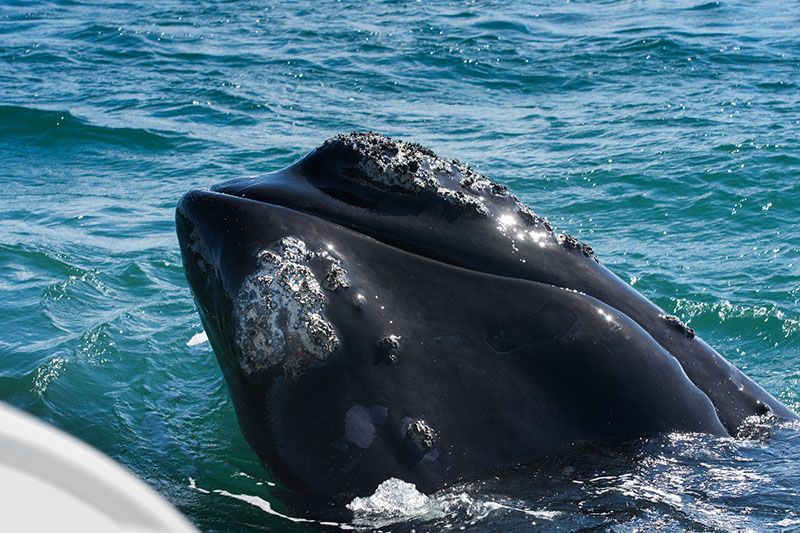
The fishing villages of Gansbaai and De Kelders that are around 2 hours and 20 minutes from Cape Town are another hot spot for southern right whales. You can watch the whales from the region’s cliffs and inlets that also offer great views of Walker Bay and Pearly Beach or join a boat tour with Dyer Island Cruises that offer daily trips to Dyer Island from Gansbaai, led by expert marine biologists who will share their pearls of wisdom about the local marine life. Alongside the whales, you might also see cute African penguins, Cape fur seals, dolphins and, on occasion, a great white shark. De Kelders is also home to some historical caves that are another great site to see whales as well as the Klipgat Hiking Trail. If you’re an outdoors enthusiast, give yourself a couple of days post whale watching to explore the nearby nature reserves of Walker Bay and Grootbos where you’ll find enchanting Milkwood forests, as well as enjoying a spot of fishing, surfing or swimming.
3. Mossel Bay
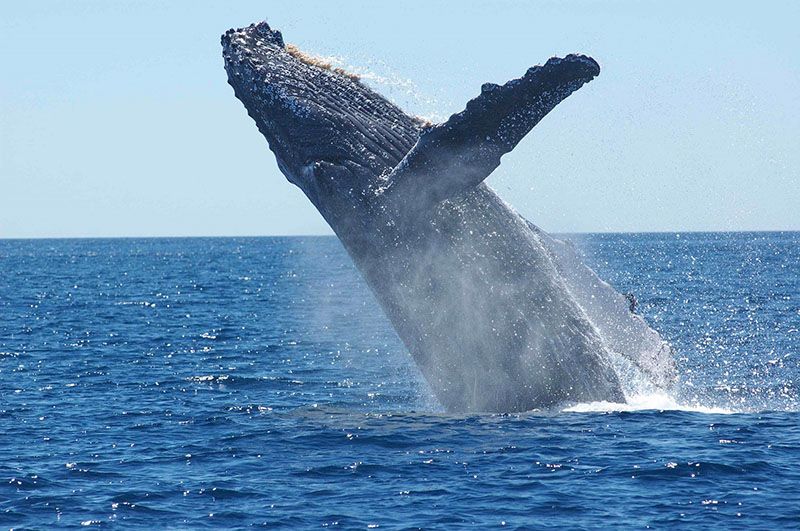
A little further afield around the coast at the famous Garden Route’s most westernmost point, Mossel Bay offers stunning viewpoints and boat tours as well as beautiful beaches and great surf. Hike the St Blaize Trail, breathing in the fresh sea air and waiting with bated breath for the familiar blowhole sprays and a sleek fin or head slowly emerging from the water. Another great attraction here is the Mossel Bay Seal Island that’s the stomping ground for over 4,000 Cape fur seals.
4. Witsand
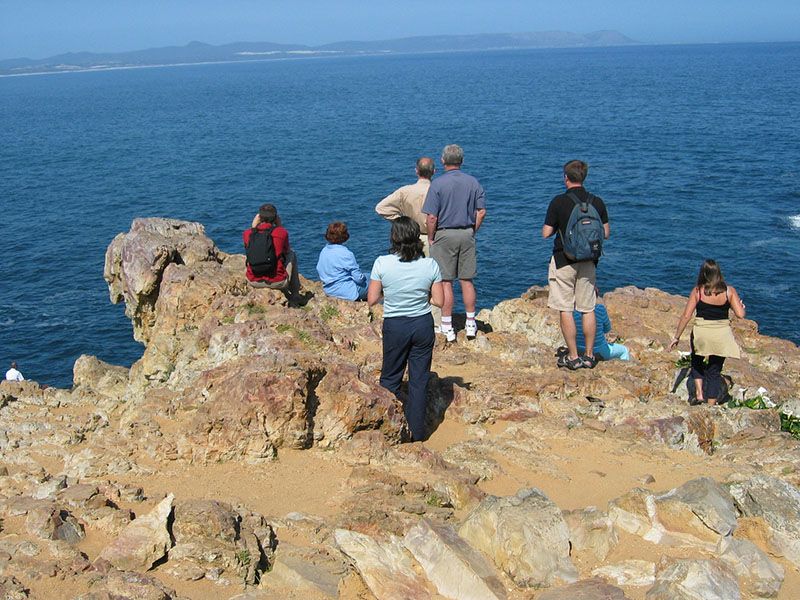
This quaint town around three and a half hours from Cape Town is famous for its land-based whale watching because a lot of whales choose the sheltered San Sebastian bay as their birthing ground (making boat trips out of the bay impossible). The whales come in very close to the shore once they’ve given birth so you’ll get to see the cute newly born calves playing in the water too. It’s widely known as a whale nursery because it’s attracted close to 100 whale mothers-to-be in any one year so you’re guaranteed a sighting.
5. False Bay
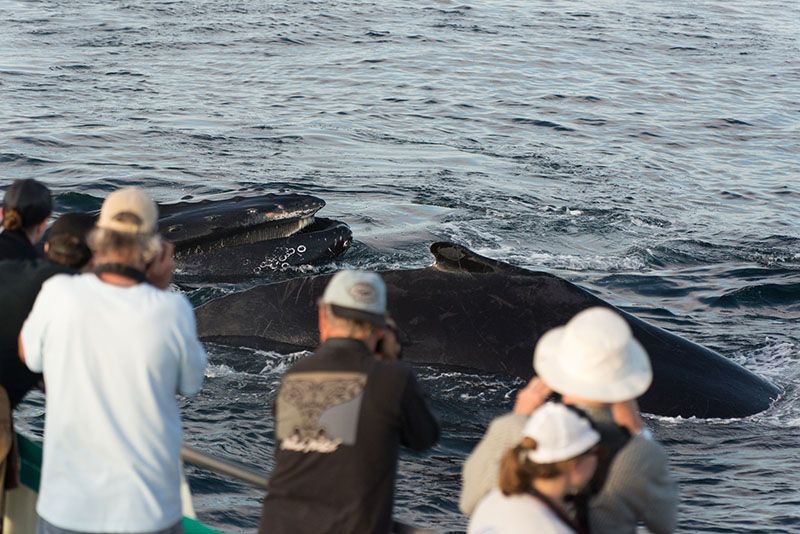
If you don’t feel like travelling too far out of the city, there are many great vantage points along the historic False Bay coastline that was previously a whaling zone back in the day but whose residents now harbor a strong reverence for the beloved mammals. Top spots include Cape Point, Hout Bay, Boyes Drive between St James and Kalk Bay, and Clarence Drive between Gordon’s Bay and Rooi Els. You can also sign up for one of Simon’s Town Boat Company’s whale tours that offer daily tours at 10.30am and 2pm leaving from Simon’s Town (be sure to book in advance).
Top tips: Have a pair of binoculars and your camera (or smartphone) on hand at all times so as not to miss a viewing or photo op. Many of the viewing points have stations set up that you can call ahead of time to make sure the whales are out and about before you go.
Got any other useful tips for whale watching in South Africa? Tell our readers about them in the comments section below.
Originally published on Ailola by Sophie Lloyd on February 12, 2018.
